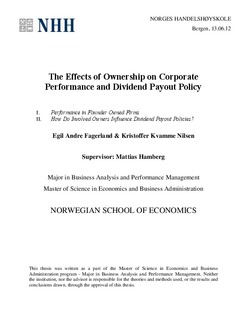The effects of ownership on corporate performance and dividend payout policy : I. Performance in Founder Owned Firms. II. How Do Involved Owners Influence Dividend Payout Policies?
Master thesis
Permanent lenke
http://hdl.handle.net/11250/169759Utgivelsesdato
2012Metadata
Vis full innførselSamlinger
- Master Thesis [4372]
Sammendrag
This thesis consists of two separate papers where the first study examines performance in founder owned firms and the second assess how involved owners influence dividend payout policies. All our tests are based on an extensive data set that initially consists of 2671 firm-year observations, and includes 375 firms traded on the Stockholm Stock Exchange (Stockholmsbörsen), over the period 2001 - 2010.
In the first study we use several regression analyses to study the effects of founder ownership on performance measured by Return on Net Operating Assets and Tobin‟s Q. Our findings support earlier research in that founder owned firms have a positive influence on performance. Additionally, to the best of our knowledge, we find novel evidence that indicate a somewhat exponential relationship between founder ownership and firm performance. When testing for founders who have positions as CEO, board member and/or chairman, we find that they have a slightly lower positive net effect on firm performance. Finally, we prove that founder owned firms perform better than firms who have long-term owners. To our understanding, this is also a novel empirical finding.
In the second study we employ a model consisting of both Logit and Tobit regressions to test how firm owners with firm involvement through being a founder or long-term owner affect cash dividend payout policies. Our findings show that involved owners have more aggressive cash dividend policies than others. When examining different ownership involvement levels, we find that increased ownership involvement leads to more aggressive dividend payout policies. Finally, our results unexpectedly indicate that founder owners who are solely CEO have less aggressive payout preferences than others. These results do not only contribute to the sparse literature on how agency costs affect payout preferences, but are as far as we know, also novel empirical findings.
